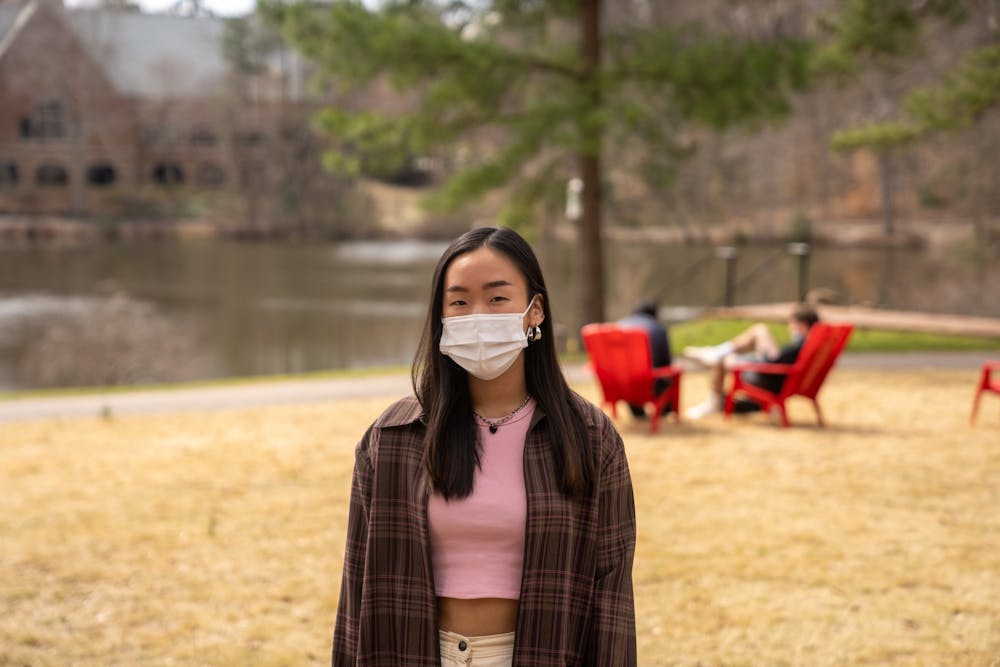Increased hate crimes and harassment faced by Asian and Asian-American people throughout the COVID-19 pandemic continue to affect Asian students on the University of Richmond campus.
Hate crimes against Asian people spiked by 150% in the largest cities in the United States in 2020, according to a study by the Center for the Study of Hate and Extremism, with the first wave of harassment and hate crimes starting approximately a year ago when COVID-19 emerged in the U.S. Throughout the pandemic, there has been coverage both in news outlets and social media about anti-Asian behavior.
Although, overall, Anti-Asian people's behavior has been underreported in the news and on social media until the current spike in harassment.
“Nobody talked about it, nobody cared,” sophomore Penny Hu said. “And no news coverage about like ‘Hey, that’s not acceptable.’”
Former President Donald Trump began calling COVID-19 the “China virus” when the virus first began to spread across the U.S. He continued to do so throughout his presidency, despite criticism that his remarks were racist and anti-Chinese.
Friends told Hu they had been referred to as a “Chinese virus” on campus around last March, she said.
In another incident, at the beginning of the fall 2020 semester, Hu and a friend were trying to eat outside of the Alice Haynes Room. When Hu's friend asked a nearby table of students to borrow a chair, the students looked at her as if she was gross, Hu said. Hu did not know whether the students had realized they were making a face or were doing so intentionally, but it made her and her friend feel uncomfortable, she said.
Although Asian and Asian-American people have dealt with racist stereotypes before COVID-19, the types of remarks and intensity of discrimination has worsened in the past year, Hu said. Before the pandemic, Hu had been asked whether all Asians did kung fu and whether she was “poor like all Chinese people,” she said. During the pandemic, microaggressions have changed from ignorant, racist stereotypes to placing blame for COVID-19, Hu said.
General increased awareness of microaggressions and implicit biases that might cause them is important to address the anti-Asian behavior, Hu said. Hu is currently helping organize the “Not So Slight: Combating mAcroaggressions” workshop series occurring on March 30 and April 1 for campus community members to talk and learn more about microaggressions.
Junior Haley Hom, who is co-founder and activities chair of the Asian American Student Union (AASU) on campus, also faced microaggressions as the COVID-19 pandemic began. At the beginning of the pandemic in the U.S. last spring, Hom or her friends would walk into common spaces such as 8:15 at Boatwright or through Tyler Haynes Commons and notice people moving away from them, she said.
“They would give you like almost like that instinctual six-foot bubble, as if you had the disease or you were a carrier,” Hom said.
Even when people are not explicit in their discrimination toward Asian people, microaggressions are a burden on the Asian community, she said.
Enjoy what you're reading?
Signup for our newsletter
“Those types of little microaggressions — when they look at you and you just can hear the tone or the attitude of seeing you as a carrier of the virus instead of who you are as a person … that kind of framing comes first,” Hom said.
First-year Yuna Chung, who is Korean American, has not faced discrimination from people on campus, she said.
But Chung was confronted with racism over the summer when going to the drugstore near her house in New Jersey, she said.
“This man got off a bus and started yelling at me," Chung said. "It was a white man. ... It sounded like he was saying, ‘Go back to your country’ or something like that.”
Many Americans often group Asian and Asian-American people into a monolithic group, Chung said.
“Because there's the negative stereotype of, ‘Oh, this virus came from China,’ [people] associate a lot of, especially East Asian people, with those negative stereotypes,” she said.
Many of the videos on social media documenting violence against Asian people have shown attacks on elderly people. Chung has anxiety thinking about how her parents will be treated when they grow older, she said. Her friends who have grandparents in the United States have talked about constantly worrying about their safety, she said.
AASU is trying to provide a space where people can feel safe sharing about things such as personal encounters with discrimination on campus, Hom said. In a recent meeting, members discussed specific attacks against Asian Americans and Asian-based or Asian-run establishments, Hom said.
“I think it’s scary because it’s one of those instances where you realize, this could easily happen to us," Hom said. “It's one of those threats that lingers at the back of the mind.”
Many people in AASU have been trying to raise awareness of the increased racism Asian people are facing via social media, through conversations with friends and in the classroom, Hom said.
Contact newsletter director Eileen Pomeroy at eileen.pomeroy@richmond.edu.
Support independent student media
You can make a tax-deductible donation by clicking the button below, which takes you to our secure PayPal account. The page is set up to receive contributions in whatever amount you designate. We look forward to using the money we raise to further our mission of providing honest and accurate information to students, faculty, staff, alumni and others in the general public.
Donate Now



